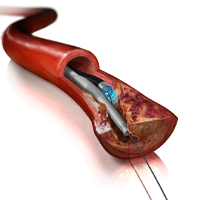
September 26, 2014 — The first large prospective study to examine the effectiveness of laser atherectomy in the treatment of femoropopliteal in-stent restenosis (ISR) found that the procedure combined with percutaneous transluminal angioplasty (PTA) was more effective than PTA alone. Findings of the EXCITE ISR trial were reported at the Transcatheter Cardiovascular Therapeutics (TCT) scientific symposium.
Femoropopliteal stenting is an effective treatment for peripheral arterial disease. However, restenosis (re-narrowing or re-occlusion within the stented segment) is very common, with more than 115,000 ISR procedures performed each year in the United States. Once ISR develops, there is a 65 percent chance of recurrence after re-treatment with PTA.
Laser atherectomy is a minimally invasive catheter-based procedure that vaporizes plaque and thrombus, restoring blood flow. The multi-center, prospective, randomized, controlled EXCITE ISR trial compared the safety and efficacy of laser atherectomy with adjunctive PTA to PTA alone in the treatment of patients with femoropopliteal ISR. The primary efficacy endpoint was freedom from clinically driven target lesion revascularization (TLR) through six months of follow up. The primary safety endpoint was major adverse events (MAEs) at 30 days, including all-cause mortality, major amputation in the target limb, or TLR. Major inclusion criteria included ISR target lesions larger than or equal to 40 millimeters, vessel diameter between 5-7 millimeters, and Rutherford class one to four. The trial enrolled 250 patients at 40 clinical sites, randomizing them in 2:1 fashion: a total of 169 subjects were enrolled in the treatment arm (laser atherectomy and PTA) and 81 patients enrolled in the control arm (PTA alone). Both groups were similar in baseline demographics and lesion characteristics.
Lesion length averaged 190 millimeters and more than 30 percent of patients presented with total occlusion. Compared to PTA alone, laser atherectomy with PTA demonstrated superior procedural success (93.5 percent vs. 82.7 percent, p= 0.02). Freedom from TLR at six months was 73.5 percent for the laser atherectomy with PTA group compared to 51.8 percent for the PTA group (p < 0.005). The 30-day MAE rates were 5.8 percent for the laser atherectomy with PTA group compared to 20.8 percent for the PTA group (p < 0.001).
“EXCITE ISR demonstrates that laser atherectomy devices used with PTA are superior to PTA alone in treating even the most complex lesions in patients with femoropopliteal peripheral artery disease,” said lead investigator Eric Dippel, M.D. from the Genesis Heart Institute in Davenport, Iowa. “The procedure leads to better outcomes than the current practice and significantly reduces adverse events when treating in-stent restenosis compared to PTA alone.”
The EXCITE ISR trial was funded by Spectranetics. Dippel reported consulting fees/honoraria from Abbott Vascular, Boston Scientific, Covidien, and Spectranetics. He also reports equity in Spectranetics.
For more information: www.crf.org, www.tctconference.com


 January 05, 2026
January 05, 2026 









